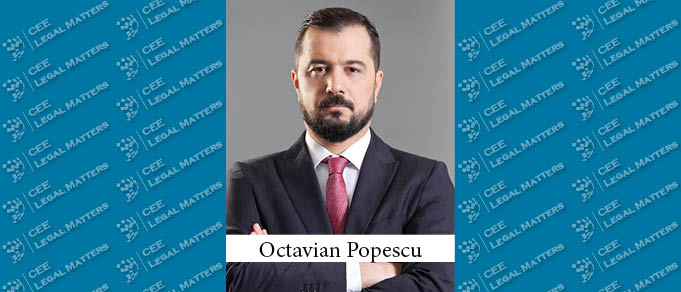The hot practice for Popescu & Asociatii over the past year has been Dispute Resolution, with the pandemic crisis as a primary driver of work, according to Partner Octavian Popescu, who reports about a vibrant 2021 and looks ahead to a similar 2022.
“While we did have a number of practices that were very active in 2021, I have to say that dispute resolution saw the biggest surge in terms of workload,” begins Popescu. “We have been active in litigation cases across the board: commercial, administrative, intellectual property, banking & finance, tax, insolvency, employment, real estate, securities, or transportation” he reports.
Popescu says that 2021 was a good year for dispute resolution, in part, because of several “large market players deciding to take to cleaning up strenuous relationships and contested situations” which were obstructing their business. “More so than in 2020, I have to say, we’ve seen big companies deciding to pursue litigation in such a decisive manner,” he notes.
As an example, Popescu points to the case in which the firm is representing the largest company in Eastern Europe producing more than 140 assortments of beverages and food products, “in one of the most significant cases pending before the courts for several years now. After a long journey, this case is finally reaching its highest point in resolution,” he says.
The file, according to Popescu, has “great importance for Romania because it sets a precedent with respect to how bilateral investment treaties are to be treated. Following Romania’s accession to the EU, all intra-union BITs should have been dissolved; however, the client sought damages from the Romanian state, based on a BIT still in force at the moment of starting the legal procedure, to the tune of several million euros.” After obtaining a favourable decision in front of an investment tribunal, Popescu says the European Commission requalified the awarded damages as alleged state-aid, impeding the Romanian state's ability to pay the damages. The client is currently challenging the European Commission decision before the European Court of Justice in "the largest state aid commercial procedure that Romania has seen in the past 30 years,” according to Popescu.
Another example of the firm’s Dispute Resolution practice activity Popescu points to is the ongoing work for Banca Transilvania, the bank with the highest market share in Romania. “We’ve been working hard on helping the bank with a number of dilatory disputes, both domestically and abroad,” he says.
Popescu feels that the firm’s practice experienced such a surge due to the “pandemic crisis somehow influencing the appetite of companies to pursue litigation and dispute resolution. While the levels of activity are still not as high as they were during the 2008/2009 crisis, the cases are more complex and diverse now,” he reports. “The backlog that 2020 created, when the pandemic first hit, had unclogged last year which made way for more dispute resolution activity.”
Finally, looking ahead, Popescu believes that 2022 holds a similarly bright future for the firm’s Dispute Resolution practice. “With a number of ongoing crisis situations in Europe, the war in Ukraine, Russian sanctions, and the pandemic, to name a few, I expect there will be a lot of fallout, litigation-wise,” he says. “The fulfilling of contractual obligations will get tested and I think that many companies will face challenges in defending the way in which they chose to adapt to the new market realities,” Popescu concludes.

















